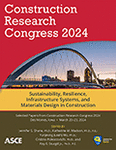Pattern Analysis of LEED v4 Rating System
Publication: Construction Research Congress 2024
ABSTRACT
Green building design and construction are important in mitigating the health and environmental effects of indoor air pollution and climate change. The Leadership in Energy and Environmental Design (LEED) rating system becomes essential for ensuring cost-effective, healthy, and environmentally friendly buildings. While the list of LEED certification credits can collectively contribute to sustainability in buildings, the comprehensive compliance of LEED-certified buildings with the entire list is still questionable. In this respect, this study investigates the key categories contributing to the highest LEED scorecard points and explores the relationship between different LEED rating parameters. This study compares LEED ratings of 40 buildings certified by LEED v4 with the highest point totals and analyzes their scorecards in various categories. The findings suggest how different LEED categories can be synergized with each other for an effective certification process. The patterns of current LEED certified buildings can be used to advance green building practices and can guide future research directions, ultimately contributing to sustainability in built environments.
Get full access to this article
View all available purchase options and get full access to this chapter.
REFERENCES
Amiri, A., Ottelin, J., and Sorvari, J. (2019). “Are LEED-Certified Buildings Energy-Efficient in Practice?” Sustainability (Basel, Switzerland), 11(6), 1672–. https://doi.org/10.3390/su11061672.
Cheng, J. C., and Das, M. (2014). “A BIM-based web service framework for green building energy simulation and code checking.” Journal of Information Technology in Construction (ITcon), 19(8), 150–168.
El-Diraby, T., Krijnen, T., and Papagelis, M. (2017). “BIM-based collaborative design and socio-technical analytics of green buildings.” Automation in Construction, 82, 59–74. https://doi.org/10.1016/j.autcon.2017.06.004.
Elkhapery, B., and Kianmehr, P. (2020). “Benefits of retrofitting school buildings in accordance with LEED v4.” Journal of Cleaner Production, 196, 1097–1109. https://doi.org/10.1016/j.jobe.2020.101798.
ElSorady, D. A., and Rizk, S. M. (2020). “LEED v4.1 operations & maintenance for existing buildings and compliance assessment: Bayt Al-Suhaymi, Historic Cairo.” Alexandria Engineering Journal, 59(1), 519–531. https://doi.org/10.1016/j.aej.2020.01.027.
Ferreira, A., Pinheiro, M. D., de Brito, J., and Mateus, R. (2023). A critical analysis of LEED, BREEAM and DGNB as sustainability assessment methods for retail buildings. Journal of Building Engineering, 66, 105825–. https://doi.org/10.1016/j.jobe.2023.105825.
GBD (Global Burden of Disease) Study Data Resources. (2019). Retrieved April 20, 2023, from https://ghdx.healthdata.org/gbd-2019.
Ismaeel, W. S. E. (2022). “Sustainable site selection using system dynamics; case study LEED-certified project.” Architectural Engineering and Design Management, 18(4), 368–386. https://doi.org/10.1080/17452007.2021.1889955.
Jalaei, F., Jalaei, F., and Mohammadi, S. (2020). “An integrated BIM-LEED application to automate sustainable design assessment framework at the conceptual stage of building projects.” Sustainable Cities and Society, 53, 101979–. https://doi.org/10.1016/j.scs.2019.101979.
Lei, M., and Cui, T. (2022). “A Scientometric Analysis and Visualization of Global LEED Research.” Buildings (Basel), 12(8), 1099–. https://doi.org/10.3390/buildings12081099.
Luo, W. K., Scofield, J. H., and Qiu, Y. (2021). “Water savings of LEED-certified buildings.” Journal of Cleaner Production. 208, 935–947. https://doi.org/10.1016/j.resconrec.2021.105856.
Patel, A., Shelake, A., and Yadhav, A. (2023). Sustainable construction by using novel frameworks using BIM, LEED, and Lean methods. Materials Today: Proceedings. https://doi.org/10.1016/j.matpr.2023.02.238.
Pham, D. H., Kim, B., Lee, J., and Ahn, Y. (2020). “An Investigation of the Selection of LEED Version 4 Credits for Sustainable Building Projects.” Applied Sciences, 10(20), 7081–. https://doi.org/10.3390/app10207081.
Ryu, H.-S., and Park, K.-S. (2016). “A Study on the LEED Energy Simulation Process Using BIM.” Sustainability (Basel, Switzerland), 8(2), 138–138. https://doi.org/10.3390/su8020138.
Sadikoglu, E., Demirkesen, S., and Zhang, C. (2022). “Identifying the Commonalities between Lean Construction and LEED Requirements.” 269–277. American Society of Civil Engineers. https://doi.org/10.1061/9780784483954.028.
Seminara, P., Vand, B., Sajjadian, S. M., and Tupenaite, L. (2022). “Assessing and Monitoring of Building Performance by Diverse Methods.” Sustainability (Basel, Switzerland), 14(3), 1242–. https://doi.org/10.3390/su14031242.
Tushar, Q., Bhuiyan, M. A., Zhang, G., and Maqsood, T. (2021). “An integrated approach of BIM-enabled LCA and energy simulation: The optimized solution towards sustainable development.” Journal of Cleaner Production, 289, 125622–. https://doi.org/10.1016/j.jclepro.2020.125622.
USGBC (United State Green Building Council). (n.d.). Retrieved April 28, 2023, from https://support.usgbc.org/hc/en-us/articles/4404406912403-What-is-LEED-certification-.
Waldman, P. E. (2022). “Utilizing Prefabrication in Order to Achieve LEED Credits.” Construction Management.
Wong, J. K.-W., and Kuan, K.-L. (2014). “Implementing “BEAM Plus” for BIM-based sustainability analysis.” Automation in Construction, 44, 163–175. https://doi.org/10.1016/j.autcon.2014.04.003.
Information & Authors
Information
Published In
History
Published online: Mar 18, 2024
Authors
Metrics & Citations
Metrics
Citations
Download citation
If you have the appropriate software installed, you can download article citation data to the citation manager of your choice. Simply select your manager software from the list below and click Download.
